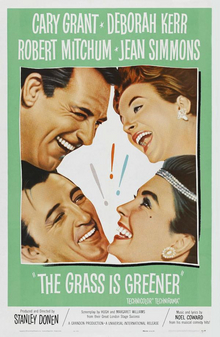|
The Grass Is Greener
The Grass Is Greener is a 1960 British romantic comedy film starring Cary Grant, Deborah Kerr, Robert Mitchum, and Jean Simmons. It was directed by Stanley Donen, with a screenplay adapted by Hugh Williams and Margaret Vyner from the play of the same name they had written and found success with in London's West End. PlotVictor and Hilary, the Earl and Countess of Rhyall, are dealing with the financial challenges of owning a large English country house and estate in twentieth century Britain when inheritance taxes have taken a toll on their financial situation. Like many other such estates, they have opened up their house for guided tours for the public at two shillings and sixpence per person, but are making a comfortable profit on it, growing mushrooms for market, and other minor estate-related enterprizes. Charles Delacro removes a large "Private" sign on the door and barges into the private quarters, finding the attractive young Hilary alone. At first annoyed, her behaviour is transformed when she learns that he is a millionaire American oil tycoon. Despite knowing that she is married, he makes very clear his attraction to her and his aggressive intentions. Initially put off, Hilary is attracted by his brazen charm, and offers him a drink. After a stroll around the property together Charles invites her to visit him at the Savoy hotel in London where he is staying, making no pretensions over inviting her to have an affair with him. When Victor suddenly enters the room, he notices Hilary's attitude, and treats Charles with exaggerated courtesy. Hilary is clearly discomfited when it is obvious that Victor knows what game is on. That evening, Hilary makes an appointment with her hairdresser in London for early next day, explaining to Victor that she will have to stay overnight with their friend, the single Hattie Durant. Rather than behave outwardly jealously, Victor offers her train times and affects not to know the real reason for her trip. Meanwhile, Charles tracks down Hilary’s hairdresser and appointment, and is outside waiting when she leaves. They go back to Charles’ hotel room and into the bedroom. Next day, Hilary does not return home; instead, Hattie, an ex-girlfriend of Victor's who still carries a torch for him, arrives, anxious to tell him about his wife's affair. Victor phones Charles' hotel and invites him to visit; he accepts, against Hilary’s wishes, and even offers to give her a lift back from London. When they appear next day Victor is determined to remain civilized at all times, and initially acts as if he is still in the dark. The two men go fishing together and Victor tells Charles he knows about the tryst and that he feels a compulsion to defend his honour, and challenges Charles to a duel, which Charles feels he cannot refuse. In a long corridor in the mansion, they go through with it, firing once apiece, with Victor wounded in the arm and Charles unharmed. It is later revealed that both men fired to miss, as Victor expected Charles would do, while Sellers, the family butler, an ex-army man and an expert shot, wounded Victor with a weapon of his own. When the women learn of the duel and Victor's wound, Hilary cannot bring herself to leave her loving husband for Delacro, who drives off with Hattie in her stead. Cast
ProductionRoy Ward Baker wanted to make the film at Rank and tried to get the rights.[2] Originally Cary Grant turned down the role of Victor. Afterwards the role was subsequently offered to his friend Rex Harrison, who accepted. However right before production began, Harrison's wife Kay Kendall fell gravely ill and he was forced to leave the production in order to tend to her. Grant, out of respect for cast and crew, and to keep the filming running according to schedule, decided then to finally take the part. It was originally intended by director Stanley Donen that Grant would play the part of Delacro, the American tourist, while Harrison and Kendall were respectively cast as "Victor Rhyall" and "Hattie". But Kendall died soon after completing an earlier Donen film, Once More, with Feeling!, and Harrison dropped out of the film because of this. Grant agreed to play Victor instead of Delacro, and both Rock Hudson and Charlton Heston were approached about playing the American character. Both refused, and Robert Mitchum was cast quite late in the proceedings, making no fuss at all about taking third-billing. Grant often claimed this had "saved the film" and praised his performance highly. Most of the cast had worked together a number of times before. It was the third of four movies that paired Deborah Kerr and Robert Mitchum, the third time Jean Simmons had worked with Kerr and Mitchum, and Cary Grant's third collaboration with Deborah Kerr, with whom he had worked on Dream Wife (1953) and An Affair to Remember (1957). Moray Watson (Grant's butler) was the only member of the original stage cast to be retained for the film version. British interior decorator Felix Harbord served as the film's special consultant for settings. Osterley Park was used as the location for the stately home. ReceptionBy January 1962, the film earned $3 million in box office rentals from the United States and Canada.[3] Stanley Kauffmann of The New Republic wrote- "The film is an exceptionally deftly written piece of English "triangle" fiuff by Hugh and Margaret Williams, has good performances by Cary Grant and Deborah Kerr, and the presence of Robert Mitchum. Stanley Donen, the director, has coped reasonably well with essentially uncongenial film material. The dialogue and Miss Simmons are warmly recommended as warm mid-winter tonics."[4] On the review aggregator website Rotten Tomatoes, 88% of 8 critics' reviews are positive, with an average rating of 6.6/10. as of January 2024.[5] At the time of its release, Jean Simmons's performance as a madcap heiress earned some praise and a Laurel Award nomination. References
External links |
||||||||||||||||||||||||||||||||||
